WATERSHED MOMENTS, THE VIDEO TRILOGY SERIES: “There are so many variables to take into account when making a video in the age of COVID. We have created a blueprint for ‘getting it right’ by exceeding local, provincial and federal requirements,” stated David Mackenzie, technical director and volunteer extraordinaire (Announcement #2, September 2020)
Note to Reader:
In our weekly newsletters from September through June, Waterbucket eNews celebrates the efforts of individuals whose commitment to the common good is what makes a material difference, over time, vis-à-vis “reconnecting hydrology and ecology” in altered landscapes. COVID has changed how we do everything, especially outreach and peer-based education. Thus, the challenge for everyone is how to be bold and turn a problem into an opportunity.
In this issue, we present two companion stories in order to feature two individuals – David Mackenzie and Richard Boase – who have seized the moment to lead the way and demonstrate how to leverage YouTube to deliver Watershed Moments, the Trilogy Video Series. In the article below we reveal what is taking place behind the camera to ensure success on screen.
EDITOR’S CONTEXT
“The Partnership and NALT, the Nanaimo and Area Land Trust, share a vision for harnessing the power of collaboration and inspiring communities to take action to reconnect hydrology and ecology,” states Kim Stephens, Executive Director, Partnership for Water Sustainability in British Columbia.
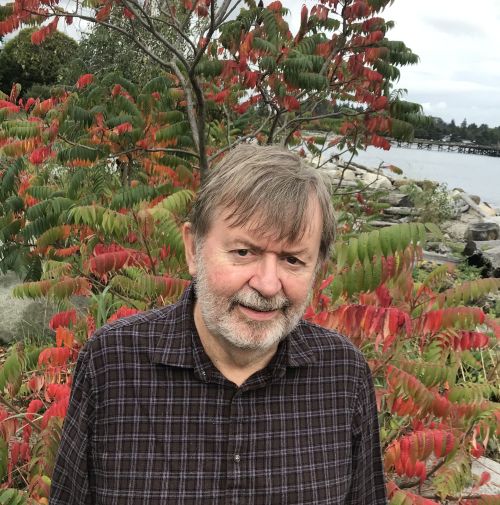 “Over the past four years, our shared vision for the Vancouver Island Symposia Series on Water Stewardship in a Changing Climate as a “convening for action” forum has evolved through a building blocks approach. Each time we point the way to the next. We pose this question to challenge our audiences: What will YOU do differently when you leave this room? Participants tell us that they come away inspired.
“Over the past four years, our shared vision for the Vancouver Island Symposia Series on Water Stewardship in a Changing Climate as a “convening for action” forum has evolved through a building blocks approach. Each time we point the way to the next. We pose this question to challenge our audiences: What will YOU do differently when you leave this room? Participants tell us that they come away inspired.
“Earlier this year, we set out to raise the bar yet again with Comox Valley 2020. And then COVID changed everything. But COVID has not deterred us from the mission. When one door closes, another opens. David Mackenzie, NALT volunteer extraordinaire, stepped up and opened our minds as to what could be. This is the moment, he said, to leverage technology and reach far beyond those in the symposium room. Be bold and do something other than a Zoom webinar.
“Inspired and guided by David Mackenzie’s passion, knowledge and attention to detail, a plan took shape to deliver Watershed Moments, the Video Trilogy Series via YouTube. The NALT and Partnership vision for the three videos is that they will be educational legacy resources that would inspire a snowballing of individual actions. Each video is built around a “group conversation” facilitated by the Partnership’s Richard Boase, moderator par excellence.
“The conversations were filmed in Nanaimo in a COVID-proof setting at the Vancouver Island Conference Centre. We are now in the post-production phase, which includes inter-weaving of outdoor footage. We are striving to provide an experience comparable to viewing an engaging TED Talk video. Audience interaction for each module will be an integral part of the legacy resource. Be the content that you want to see!”
REGISTRATION:
Reimagining the 3rd Annual Symposium on Water Stewardship in a Changing Climate as a “Video Trilogy Series” on Nov 19 / Nov 26 / Dec 3 (from 10:00AM to 11:30AM)
The Registration Fee for the series is a a nominal amount – $30 for stewardship groups and $50 for all others!
TO REGISTER, VISIT https://www.civicinfo.bc.ca/event/2020/Third-Water-Stewardship-Symposium-Reimagined
The focus of the Video Trilogy Series is on the whole-system approach, connecting land and water, and restoring water balance in altered landscapes. At the conclusion of each video, viewers will be able to chat in real-time with the presentation team.
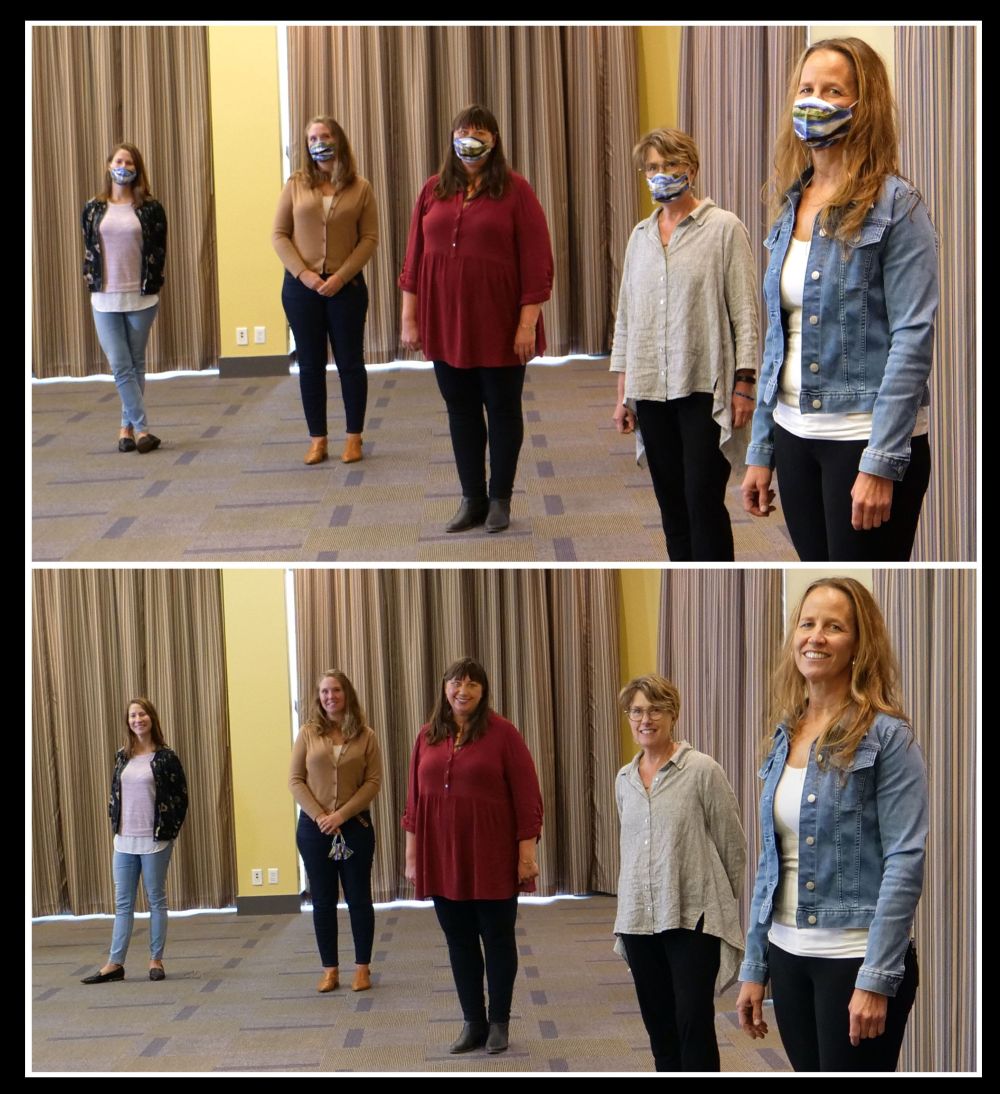
MASKED / UNMASKED: On November 19, this local government team representing four Vancouver Island regions kicks off the Video Trilogy Series with a facilitated conversation about “BC’s Climate Reality, Inter-Regional Collaboration & Actionable Visions” > Julie Pisani (Nanaimo region), Darry Monteith (Comox Valley),Jody Watson (Capital Region), Kate Miller (Cowichan Valley), and Zoe Norcross-Nu’u (Comox Valley)
Blueprint for Making Videos in the Age of COVID
“David Mackenzie’s journey from symposium audience member to communications champion has been a boon to NALT and the Partnership. David shared his passion for video production to help us realize we were missing a critical piece of our communications plan. Then, with patient mentoring and tireless volunteerism, he has led us to full online delivery of our symposium content in a unique and engaging way,” stated Paul Chapman, NALT Executive Director and Chair, Vancouver Island Symposia Series.
“ His contributions have been crucial to sustaining our stewardship message in a time of global pandemic. To say we couldn’t have done it without him is an understatement, we didn’t even know we weren’t doing it until David came along.
His contributions have been crucial to sustaining our stewardship message in a time of global pandemic. To say we couldn’t have done it without him is an understatement, we didn’t even know we weren’t doing it until David came along.
“We are fortunate to have Richard Boase as the moderator for our Watershed Moments video trilogy. Richard has a deep understanding of the subject matter resulting from three decades of stewardship work through a local government lens, has an innate ability to ask the questions that get to the heart of the matter, shares his enthusiasm with panelists and audience alike and sometimes even surprises the organizers with impromptu action items.
“In no small part, we owe the success of the Water Stewardship Symposia series to Richard’s deft involvement from planning to presentation.”
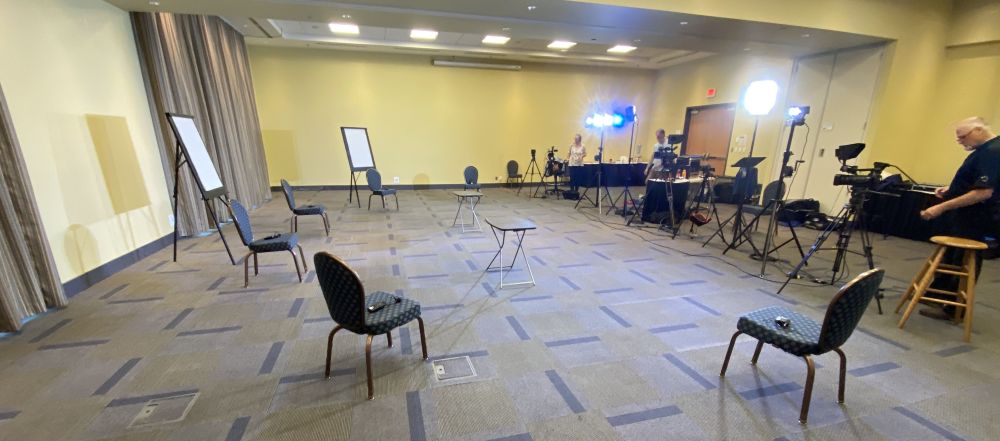
WATERSHED SPACIAL FORMULA: To be COVID-proof, one needs a 15m x 15m room for six people to have a conversation with five cameras running. Once you watch the video clip posted on YouTube, you will be primed to read Companion Story #1 next.

Video Trilogy Series Film Crew: Al – Laurie – Allen (of VITV.ca)
COMPANION STORY #1 is the community lens:
A Blueprint for Making Videos in the Age of COVID
David Mackenzie’s passion for videography makes it possible for NALT and the Partnership to elevate our message and expand our reach. He provides this perspective:
“So, how would I answer were someone to ask me: How did you pull this off? What did you not know when you started? And when you had finished, what had you learned? My answer is that I could now write a 3-page how-to-guide that explains: here is what it is; it is COVID-proof under these circumstances; it would allow you to also do what we have done. And you know what? We ran three media conferences involving over 25 people and no one got sick!”
Below, David shares the story of his transition from interested community member to technical director of the Video Trilogy Series.
Progression from Concerned Citizen to Key Team Member
“The story of how I became involved in the Video Trilogy Series shows what is possible for a concerned citizen who wishes to make a difference,” continues David Mackenzie, retired project management consultant and director.
“ In 2018, I went to the first in the Vancouver Island Water Stewardship Symposia Series looking for leadership and found it. Now, I am part of a team that depends on volunteers; and as such, I am responsible for the production side of the Video Trilogy Series.
In 2018, I went to the first in the Vancouver Island Water Stewardship Symposia Series looking for leadership and found it. Now, I am part of a team that depends on volunteers; and as such, I am responsible for the production side of the Video Trilogy Series.
“There are people out there like me who are concerned about the environment and would like to do something about it, and are motivated to help bring about necessary change. They see the environment changing. They see the world changing. So, what to do? How to help in a meaningful way?
“Several months later, I spotted John Finnie (then the Series Chair) in a store. I approached John and made my pitch. The Partnership has become an instrument of change, I said, and I can help you raise your game through videography. Long story short, NALT and the Partnership welcomed me onto the symposia series team.”
How to Inspire an Audience in the Age of COVID
“People don’t want to just follow the status quo. They want to follow people with vision. They want to work with people that exude hope, inspiration, and motivation. And also have tangible solutions to big challenges! And if they possess these characteristics, then people will find them if there is a path to follow.
“In the age of COVID, however, these leaders must find new ways to connect with and inspire an audience. But how do you inspire someone over a computer? When it is not possible for an audience to see speakers in the flesh, they need to know the back stories for the team members so that they see the connection to what is being talked about. It is the people who are inspirational, and their words simply flow from that passionate source.
“I believe people get a lot more motivation once they learn who the players are, and what they have been doing, and why. In this era of uncertainty, you have to start giving people some hope. Otherwise they are just not going to engage. They will just sit and watch and wait. If we want to lift them out of their seats, then we must move beyond a Zoom webinar.”
Watershed Formula for Producing the Video Trilogy Series
“The NALT-Partnership leadership team of Kim Stephens and Paul Chapman immediately bought into my recommendation for a 3-module video series via YouTube. Now we had to deliver!
“In the COVID world in which we are going to be in for the next little while, 15 metres by 15 metres is what I call the ‘watershed formula’. 15 x 15 is the optimum size space, and also the minimum size, for a room that is required to house up to five cameras and up to 12 people, of which six are seated in a semi-circle for a facilitated conversation.
Blueprint for Getting It Right:
“If you had told me at the beginning that we would need a room that was 15 x 15, I would have said ‘no, I think we can do it in a smaller space’. But one cannot. More importantly, we aimed to do better than the bare minimum. And we pulled it off! Every aspect of the production exceeded local, provincial and federal requirements. In the process, we have created a blueprint for ‘getting it right’ and will share it with others in the spirit of collaboration,” concluded David Mackenzie.
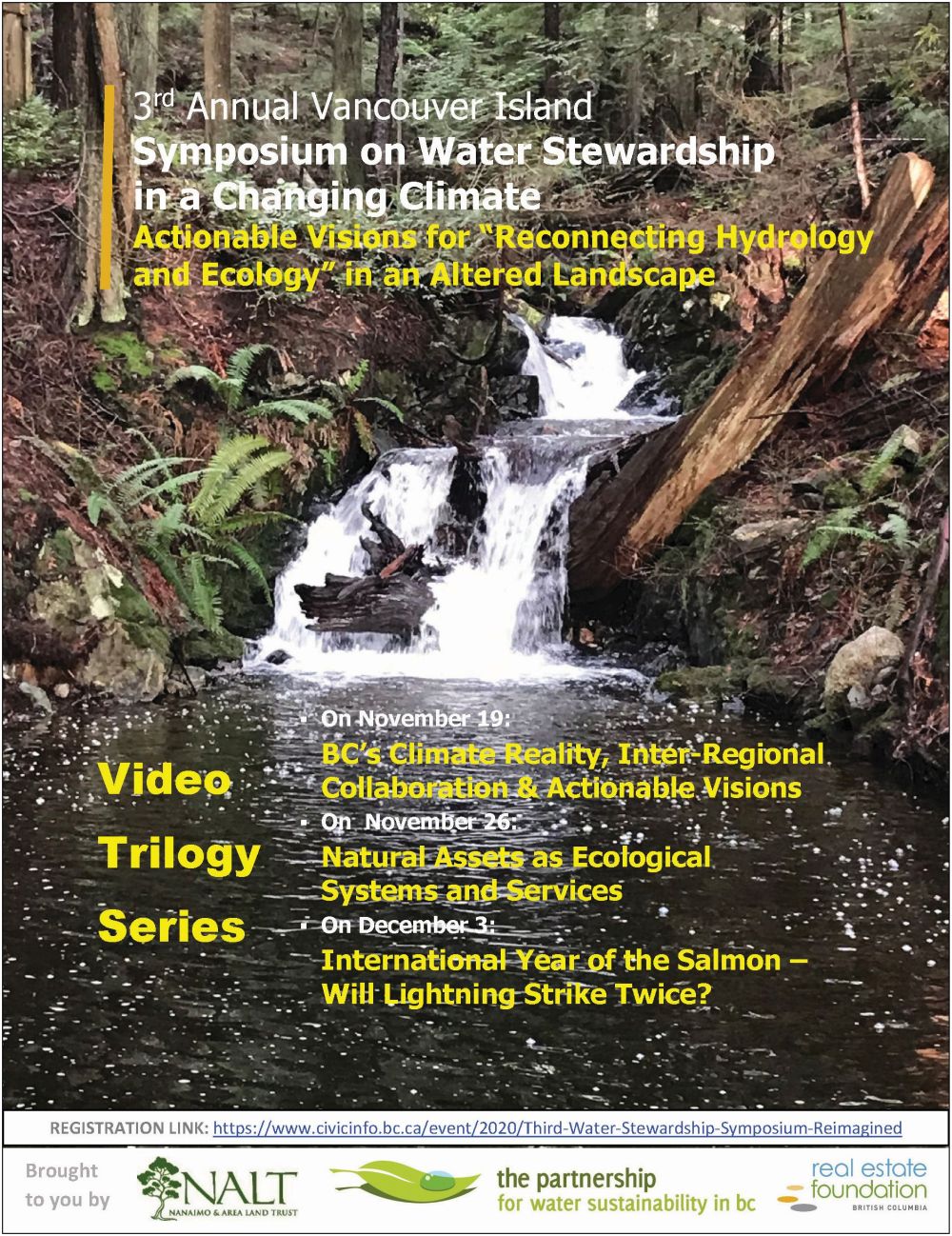
COMPANION STORY #2 is the local government lens:
Seeding Conversations about Actionable Visions
The video shoots are done, and post-production editing has begun. Below, Richard Boase reflects on his moderator role in a bold and exciting venture. His set of takeaways for the trilogy series will inform the curious!
An Overview
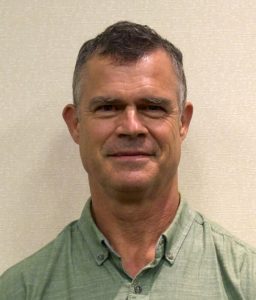 “Three module teams totaling twelve individuals are on camera in the Video Trilogy Series. Every team member is passionate about what she or he does. This is what we hope and believe will inspire series viewers to apply what they absorb from each of the team conversations. But the video series is not a magic wand. It won’t result in overnight change. Humans are not wired that way. It is therefore best to view the series as an important milestone in a journey. We hope to bring others along with us,” states Richard Boase.
“Three module teams totaling twelve individuals are on camera in the Video Trilogy Series. Every team member is passionate about what she or he does. This is what we hope and believe will inspire series viewers to apply what they absorb from each of the team conversations. But the video series is not a magic wand. It won’t result in overnight change. Humans are not wired that way. It is therefore best to view the series as an important milestone in a journey. We hope to bring others along with us,” states Richard Boase.
“Success will follow because the series will have seeded participants with information that allows them to carry on and follow a path that is right for them. It may well be a path that we may not have thought about, and that is okay. The important consideration is that each participant will have reached their own conclusions based on what they got out of the three sessions, and what resonated with them individually.”
ON NOVEMBER 19 – BC’s Climate Reality, Inter-Regional Collaboration & Actionable Visions
“The team for the first video has five dynamic women. What I like about them is the breadth of scenarios and experience among the four regional districts they represent. They are all in very different situations. But what is common to all is their unwavering desire to make things better.
“When someone has chosen to make a career in municipal or regional government, it tells me that they have a real interest in making change and seeing it happen locally, where they live. What I see with the five women is a strong sense of local commitment and integrity to making positive change in and around their immediate surroundings.”

ON NOVEMBER 26 – Natural Assets as Ecological Systems and Services
“Local government is challenged, almost on a daily basis, to make ends meet between balancing the budget and providing the type of environment the community expects and wants. Local government responsibilities span community safety (i.e. protection of residents from flooding and other natural hazards) and protection of a well-functioning, beautiful, healthy environment.
“Yet there is not a deep understanding among the public that these outcomes can be achieved with complimentary companion programs featuring green infrastructure that work in balance together. There is still a widely held view that hard engineering, in the form of pipes and concrete infrastructure is the only way in which we can make our communities safer, when in fact new science is telling us that natural green systems are far more resilient.
“That’s the gap that the work of Tim Pringle and Emanuel Machado is attempting to fill with their focus on how natural assets help support delivery of core local government services, while doing so much more. That is what participants will learn from the second video. Nature has given us the tools to deal with the climate challenges that we know are coming. That’s an important thing to remember.”
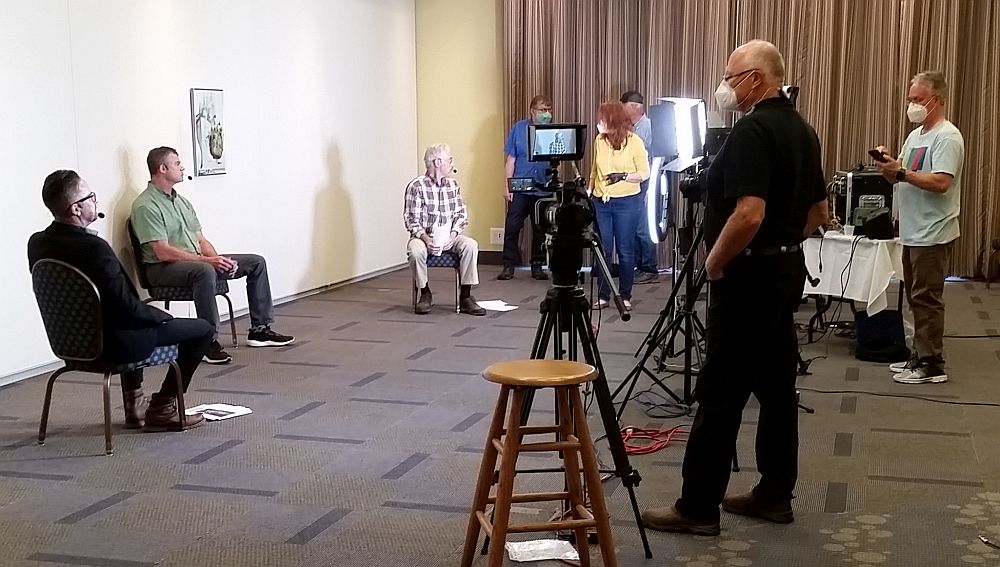

David Mackenzie / Kim Stephens / Emanuel Machado / Richard Boase / Tim Pringle / Paul Chapman
ON DECEMBER 3 – International Year of the Salmon – Will Lightning Strike Twice?
“The third module is the cornerstone of the Video Trilogy Series. Science-based understanding is the foundation for everything that needs to be done to reconnect hydrology and ecology in an altered landscape. And that is why it is strategic that we have federal and provincial participation in the series in the persons of two distinguished scientists – Dr. Kim Hyatt and Dr. Peter Tschaplinski.
“With an understanding of the science, communities would have the basic knowledge to be able to do what they need to do to restore an altered landscape. From local restoration work to lobby efforts directed at new policy, communities across the province can be better equipped with knowledge delivered by the Province and Federal governments.
“That is what was really exciting for me about this module. It has helped me envision how the provincial and federal governments can play a leadership role by committing time and money to ensure the resilience of both salmon and people.”
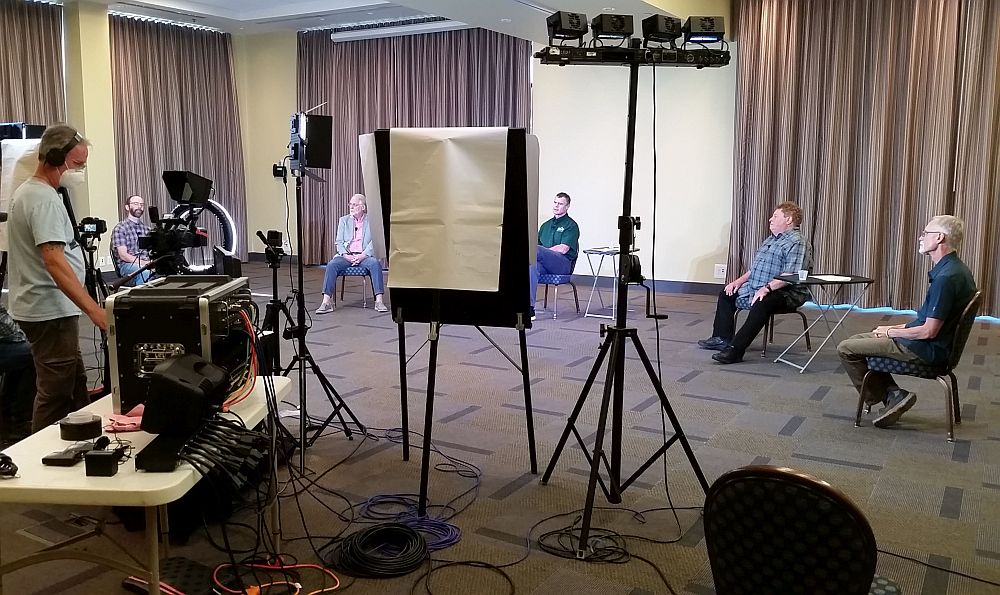
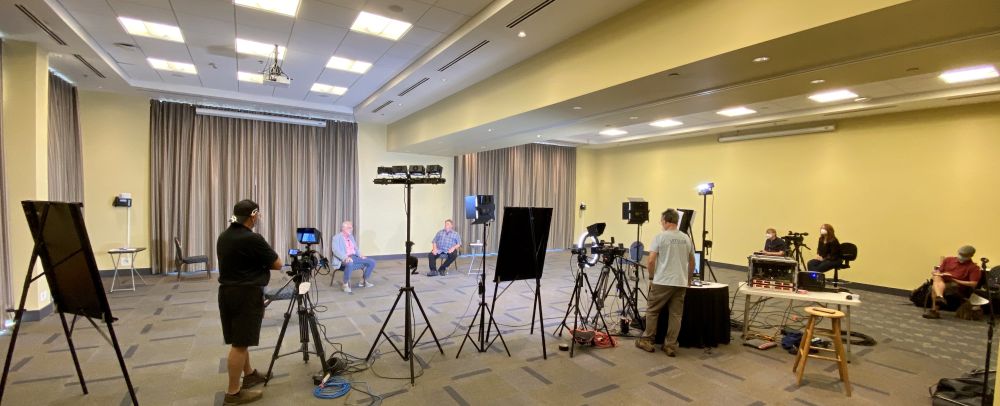

Neil Goeller / Dr. Kim Hyatt / Dr. Peter Tschaplinski / Nick Leone / Richard Boase

